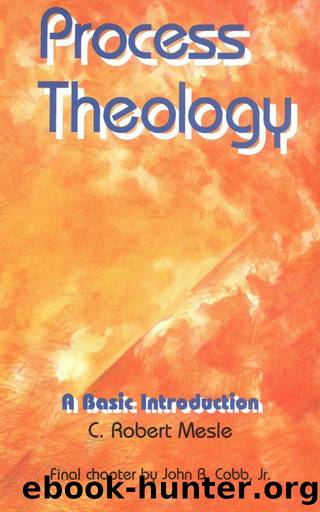Process Theology: A Basic Introduction by Mesle Robert C

Author:Mesle, Robert C. [Mesle, Robert C.]
Language: eng
Format: epub
Publisher: Chalice Press
Published: 1992-12-31T16:00:00+00:00
Women's Experience and Process Thought
W hatever we might think about men and women, it is obvious that in Western culture (and most other cultures, too) there are powerful traditions about the differences between the sexes. Many of our traditional images have clearly called men to be independent, unilaterally powerful, rational, dominating, and emotionally stern and aloof. Women have obviously been taught to be dependent upon men (hence the titles Mrs. and Miss, but only Mr.), to be emotional rather than rational, and to be cherishing and nurturing rather than dominating. The classic line, "Wait until your father gets home!" tells us volumes about how we have viewed men and women, and what it means to call God "Father."
It is hardly surprising that many people sensitive to women's issues have seen process theology as an exciting model of God. The view of God as nurturing, cherishing, persuading, participating, and suffering with us seems much closer to traditional feminine values and images than do most traditional pictures of the stern, aloof God. If we use the model of God as Parent, then the process God seems to include the qualities of a mother far more than do traditional models.
Obviously, the real goal is to transcend the temptation to make God appear more like one sex than the other. Nevertheless, we need first to continue the task of hearing, acknowledging, and learning to appreciate the histories, sufferings, values, and insights of those people who have not been in power, whose perspectives have been suppressed in most of the world by the dominant male cultures. With regard to feminism in particular, men and women have far to go in recovering women's history, listening to women's voices, and understanding and appreciating the values women can contribute to our common humanity. As we do this, we must be prepared to let these voices reshape our images of the sacred. Toward that end, I have invited Barbara Hiles Mesle * to contribute her thoughts.
By Barbara
Simply put, feminism seeks the social, economic, and political equality of both sexes. Feminists generally agree that women's culture needs to be recovered and celebrated. Feminists engage with others in seeking a safer, more gentle world for all of creation. These concerns seem to fit very well with those of process thinkers.
But discussions about differences between men and women are like a dry forest, ready to catch fire with the smallest spark. For some very good reasons, both women and men fear generalizations about their nature and behavior. How can we talk about the differences in the ways women and men experience the world without sounding as if there is no affinity—without sounding as if all men think alike and all women think alike? As one of my students put it, "Barbara, if we celebrate uniqueness, don't we just divide people? Don't we perpetuate the stereotypes and differences?"
To put the question differently, since process thinkers and feminists agree that we need to rid our thinking of dualistic and hierarchical categories, how can we
Download
This site does not store any files on its server. We only index and link to content provided by other sites. Please contact the content providers to delete copyright contents if any and email us, we'll remove relevant links or contents immediately.
The Lost Art of Listening by Michael P. Nichols(6473)
Why I Am Not A Calvinist by Dr. Peter S. Ruckman(3770)
The Rosicrucians by Christopher McIntosh(3049)
Wicca: a guide for the solitary practitioner by Scott Cunningham(2704)
Signature in the Cell: DNA and the Evidence for Intelligent Design by Stephen C. Meyer(2501)
Real Sex by Lauren F. Winner(2474)
The Holy Spirit by Billy Graham(2418)
To Light a Sacred Flame by Silver RavenWolf(2353)
The End of Faith by Sam Harris(2289)
The Gnostic Gospels by Pagels Elaine(2026)
Nine Parts of Desire by Geraldine Brooks(2007)
Waking Up by Sam Harris(1958)
Heavens on Earth by Michael Shermer(1955)
Devil, The by Almond Philip C(1899)
Jesus by Paul Johnson(1887)
The God delusion by Richard Dawkins(1848)
Kundalini by Gopi Krishna(1824)
Chosen by God by R. C. Sproul(1760)
The Nature of Consciousness by Rupert Spira(1689)
